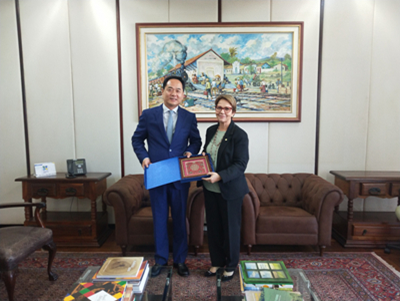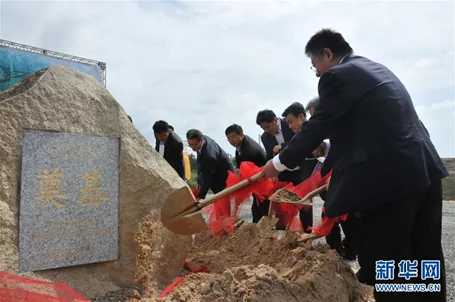
Looking Beyond Commodities Exports: China Increases its Engagement with Brazil
Publication: China Brief Volume: 19 Issue: 16
By:

Introduction
In June 2019, the People’s Republic of China (PRC) scored a victory in its relationship with Brazil when it gained the latter country’s support for the PRC’s candidate to lead the United Nations Food and Agriculture Organization (FAO), over candidates put forward by France and Georgia (Brazil Ministry of Agriculture, June 23, 2019). The PRC’s candidate, Qu Dongyu, won 108 votes (over France’s runner-up candidate with 71 votes) to become the next director-general of the FAO. The significance of Brazil’s support for the PRC over France in the international body is especially striking as it was gained the same month that Brazil and the rest of the Mercosur South American trade bloc finalized a free trade agreement with the European Union. [1]
Although in recent years the PRC has emphasized infrastructure-based investment, and while it has deepened its influence in Brazil in the cultural, diasporic, and media spheres, the relationship between the two countries remains skewed toward low value-added commodities exports from Brazil to the PRC. Despite criticisms of the PRC’s economic relationship with Brazil made by Brazilian President Jair Bolsonaro during his campaign, hard economic realities ensure that Brazil will not jeopardize its largest commodities export market.
Criticisms of a Relationship Built on Commodities Exports
Brazil has maintained diplomatic relations with the PRC since 1974. The two countries announced a “strategic partnership” with each other in 1993, and by 2009 China had become Brazil’s largest trading partner (China Brief, May 15, 2009; Brazil Ministry of Foreign Affairs, May 2, 2016). The year 2009 also saw the first “BRIC” summit of the leaders of Brazil, Russia, India, and China (later termed BRICS with the addition of South Africa in 2011). The 2014 BRICS summit, hosted in Fortaleza, Brazil, led to the creation of the New Development Bank, a Shanghai-headquartered multilateral development bank within which Brazil controls one-fifth of the voting rights. Brazil will host the five-country BRICS summit in November 2019. In 2020, Brazil is slated to host the fifth annual gathering of the New Development Bank (Brazil Ministry of Economy, April 2, 2019). Without the involvement of Brazil—Latin America’s largest economy—the BRICS framework and its attendant New Development Bank would not have a strong anchor in the Americas.
Despite the development cooperation envisioned by BRICS, as well as certain ideological affinities between the PRC and the former governments of Luiz Inacio Lula da Silva and Dilma Rousseff, the frustrations of a Sino-Brazilian relationship predicated on low value-added commodities exports have grown more apparent. Analysts have long noted the negative environmental costs for Brazil from over-reliance on agricultural and mineral exports, as well as limited opportunities to move into higher value-added industries (Stockholm Environment Institute and Global Canopy, December 18, 2018).
Brazilian President Jair Bolsonaro has made statements highly critical of China’s economic relationship with Brazil. While still a legislator, Bolsonaro lambasted Brazil’s exports of niobium to China for steel alloys (Brazil Chamber of Deputies, September 19, 2016). During Bolsonaro’s 2018 presidential campaign (and continuing into office), he frequently repeated the statement that China could “buy in Brazil” but “not buy Brazil” (Valor, April 5, 2019). Bolsonaro has also spoken out against further privatization of Brazil’s electricity sector to the PRC’s State Grid Corporation of China and State Power Investment Corporation (Valor, October 10, 2018). Bolsonaro was also the first Brazilian president to visit Taiwan, although he did so while still a candidate (Gazeta do Povo, March 9, 2018).
Despite rhetoric critical of the PRC—coupled with overtures to Taiwan—Bolsonaro’s economic team promised a pro-business, pro-trade environment unencumbered by the ideological leanings of previous governments. China remains Brazil’s largest export market for low value-added commodities such as soybeans, meat, and iron ore. Furthermore, agribusiness has been one of Bolsonaro’s core constituencies, and one that has particularly benefited from the export of soybeans to the PRC.
China Shifts Its Discourse in Brazil to Infrastructure Investments
However, while geographically distant from Brazil, the relationship between the PRC and Brazil has never been focused solely on trade. Although the two countries are geographically distant, China’s geostrategic concerns remain close to the surface; and even as the existing China-Brazil economic relationship has generated criticism, China has shifted its discourse with respect to Brazil. Discussion of the commodities export relationship has not disappeared, but it has been subsumed into China’s public discourse regarding infrastructure development in Brazil. This has also been accompanied by more active PRC outreach in the cultural, diasporic, and media spheres.
In 2017, with the launch of a $20 billion China-Brazil Fund, former PRC Vice Premier Wang Yang stated that investment in Brazil would focus on infrastructure development (PRC Embassy in Brasília, September 3, 2017). The same year Xi Jinping stated to former Brazilian president Michel Temer that the PRC “appreciates” Brazil’s long-time adhesion to a “One China” policy, and aims to “synergize” the Belt and Road Initiative (BRI) with Brazil’s own development strategies (PRC Embassy in Brasília, September 2, 2017). In 2019, PRC Vice President Wang Qishan also stressed the importance of coupling the BRI to Brazil’s development (PRC Embassy in Brasília, May 25, 2019).
While Chinese public discourse stresses large-scale infrastructure investment, the reality is that much of this investment reinforces the commodities export relationship. PRC companies have shown particular interest in projects that enhance Brazil’s infrastructure for the purpose of agricultural and mineral exports. State-owned firms such as China Communications Construction Company have taken particular interest in railroad concessions for grain transport, and the same company is currently building a port in the northern coastal city of São Luís to expand export cargoes (Xinhua, March 16, 2018; Folha de São Paulo, March 19, 2018).

Cultural Engagement by Chinese Communist Party Front Organizations
Less than a quarter of one percent of Brazil’s total population is of Chinese descent, most of whom reside in Brazil’s largest city of São Paulo. Even with the small size of the Chinese diaspora in Brazil, Chinese Communist Party (CCP) front organizations are present and have a reach that extends beyond Chinese immigrant communities. A notable front group of the CCP, the Council for the Promotion of the Peaceful Reunification of China, is active in São Paulo and Rio de Janeiro (China Brief, May 9, 2019; PRC Ministry of Foreign Affairs, July 4, 2017). The Overseas Chinese Affairs Office, absorbed into the CCP’s United Front Work Department (UFWD) in 2018 (China Brief, May 9, 2019), designates the Chinese Association of Brazil (Associação Chinesa do Brasil) in São Paulo as its main service organization for overseas Chinese in the country (Overseas Chinese Affairs Office, April 6, 2016).
There are presently 10 Confucius Institutes in Brazil (Confucius Institute Headquarters, July 2, 2019). In contrast to controversies recently seen in North America, Europe, Australia, and elsewhere, critical appraisals of Confucius Institutes are so far virtually non-existent in the Brazilian media. Furthermore, Confucius Institutes have doubled as job fairs for PRC businesses investing in Brazil: this includes surveillance companies like Hikvision and Dahua Technology, and state-run heavy machinery companies, such as XCMG, that benefit directly from BRI projects (Estadão, November 7, 2018).
The PRC’s Growing Engagement with Brazilian Media
The PRC’s state television network China Central Television (CCTV) has had a presence in Brazil since 2010, and Beijing’s engagement with Brazilian media has further ramped up in recent years. In 2017, CCTV inked a strategic partnership agreement with one of Brazil’s largest private broadcast networks, Rede Bandeirantes (PRC Consulate in São Paulo, December 6, 2017). The following year, the PRC Consulate in São Paulo held its first “Friends of the Press” reception with attendance from two of Brazil’s principal newspapers, Folha de São Paulo and Estadão, alongside Rede Bandeirantes and other media outlets (PRC Consulate in São Paulo, November 10, 2018). The same year Folha de São Paulo published a piece by the PRC Consul-General of São Paulo, Chen Peijie, that celebrated the anniversary of the countries’ diplomatic relations and characterized the relationship between the two countries as a “friendship that overcomes geographic distance” (PRC Consulate in São Paulo, August 15, 2018).
In 2019, a major Brazilian newspaper based in the country’s capital, Correio Braziliense, published an article by the Chinese Ambassador to Brazil, Yang Wanming, which stressed the PRC’s desire to “create synergy” between the BRI and Brazil’s own development, while omitting any mention of commodities in the countries’ bilateral relationship (PRC Embassy in Brasília, March 26, 2019). In 2019, Brazil’s largest private media outlet, O Globo, pubished an article by the PRC Consul-General of Rio de Janeiro, Li Yang, which also emphasized the importance of the BRI in Sino-Brazilian relations and pointed out Chinese construction of high-voltage power transmission lines for Brazil’s Belo Monte Dam (PRC Consulate in Rio de Janeiro, June 4, 2019). Similarly, no mention was made of commodities.
Conclusion
Despite China’s efforts to diversify its economic relationship with Brazil and to engage in different spheres, Brazilian agricultural exports play a growing role in the PRC’s food security. The Bolsonaro government was not about to snub the director-general of FAO, the person who would become the world’s foremost advocate of food security. This is all the more apparent as the PRC is the principal buyer of Brazilian meat products, absorbing almost 18 percent of Brazil’s total meat exports in 2018 (Brazilian Ministry of Agriculture, March 1, 2019).
The Bolsonaro government has recognized the need to diversify its commercial relationship with China into higher value-added activities such as services and renewable energy (Brazil Ministry of Economy, May 28, 2019; Brazil Ministry of Economy, June 22, 2019). Despite this, commodities exports are expected to grow. As such, criticism of the relationship will continue to surface. Observers of Brazil-China relations should watch for increased PRC presence in the Brazilian media, targeted infrastructure investments in the country, and further cultural engagement by UFWD-affiliated organizations. Such engagements, and investments under the rubric of the BRI, are gradually expanding a relationship that continues to be skewed toward low value-added commodities exports.
Shanti Salas is a private sector risk consultant who has advised companies on compliance matters for over 15 years. His area of focus is Brazil and he holds an M.A. in Latin American and Caribbean Studies from Florida International University. The views expressed in this piece are the author’s own and are not intended to reflect the positions of any organization.
Notes
[1] The 2019 EU-Brazil trade agreement, which was finalized after 20 years of negotiations, will reduce tariffs on Brazil’s agricultural exports to the European Union (Brazil Ministry of Agriculture, June 28, 2019).




